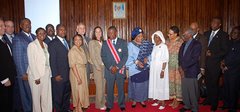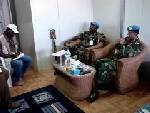INTO GUINEA: Recently I, (Publisher of the GNN, J. Cholo Brooks) traveled to the Liberian/Guinean border, specifically by way of Ganta, Nimba County, in order see if the situation in Guinea between Trade Union leaders and the government was now over, and also to cover report on the influx of thousands of Liberian refugees who fled that country due the fracas.
The situation at the Liberian/Guinean border was calm and friendly as both Liberian and Guinean securities that were approached by my presence showed the kind of receptiveness, and spoke highly of the cordial relationship between them.
“We are working together to see to it that our borders are well protected. Even though, as you can see hundreds of Liberian refugees have been crossing over from Guinea daily for fear of been trapped in the conflict,” a Liberian Immigration Officer neatly dressed and preferred not to be quoted told me.
As I cross the bridge which bordered Liberia and Guinea, several Liberians mostly middle age women and children were seen making their way back to Liberia, some visibly with sweat could highly speak to me due to their long distance travel.
"They are tired, some of them are afraid of the situation that’s the reason why they are leaving without anything, even food for the little ones to eat they don’t have it,” a Liberian now in the Guinean army, Capt. Lassana Kamara told me in a sample Liberian English.
Capt. Kamara surrounded with few of his colleagues well armed, said his commander who he named as Col. Pierre has just left before my arrival at their guidepost ordered that “Liberians coming from Guinea for Liberia should not be harassed, and if one is caught doing such to these wearied Liberians fleeing trouble will be dealt with,” Capt. Kamara told me.
Such warning from the Guinean securities gave me strength and confidence that my reportorial duty at that moment would be protected during my five hours stay in that part of Guinea. In fact my zeal to travel further beyond that point had grown to a level which took me to another Guinean commercial City of Nzerekor.
As I drove from the border on a motorbike arranged by my Guinean military friend (Capt. Kamara), the only and easier means to travel freely in that part of Africa I was told to display my Press Identification Card (ID) on me for security reason wherever I am interacting with people in the area.
As I drove on the bike exodus of Liberian refugees fleeing from their various camps were seen alone with their children walking; some children as young as 5,7,11 years old were also walking on their bare feet (without any foot ware).
After several hours of rough ride on the bike which was graced with terrible dust from the highway, I finally reached the much talked about Nzerekore commercially jammed parked with both fleeing citizens from other nearby cities, towns and villages and Liberian refugees.
Some residents who spoke to me through an interpreter in this populated Guinean City, said they were all wearied of the Country’s Trade Union strike action, “we are confused of what is obtaining from Conakry, as you can see people from other regions of the country have left and are here for rescue,” Mamade Seila, a petty trader said.
Due to my lack of the French language, I was compelled to haired one interpreter, Jakateh Moussa, 36, who claimed to have lived in Liberia in the early 1990s during the civil war. He was indeed helpful during my six hours stay in that city; gathering pieces of information about Guinean Trade Union strike action which crippled bulk of the country’s commercial activities.
Residents who spoke to me called on their fellow compatriots to press forward their demands to the government, “despite the hardship we’re going through due to the strike action, Conte must give us what we want,” a Guinean shoemaker, only named as Mamus asserted.
Before leaving this Guinean commercial City, my interpreter Moussa, received from me his fees ($US10.00), and promised to contact me at a later date. I drove safely with my chartered Motorbike back at the Liberian/Guinean border and back to Monrovia. This report is the first in the series of the many to come.
Subscribe to:
Post Comments (Atom)



No comments:
Post a Comment